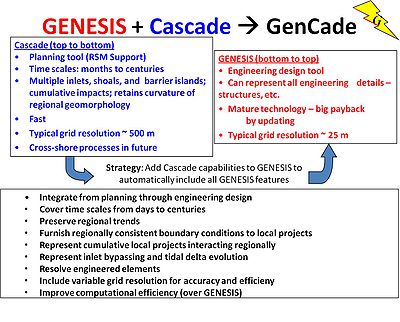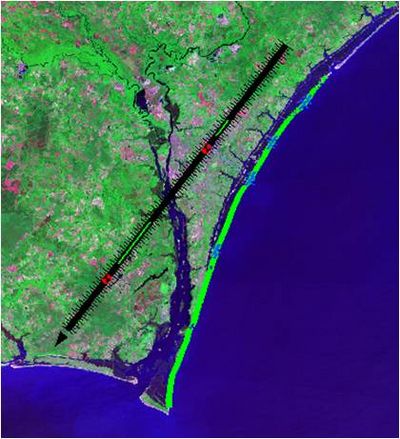GenCade: Difference between revisions
| Line 33: | Line 33: | ||
* [[GenCade_Example|GenCade Tutorial/Example]] | * [[GenCade_Example|GenCade Tutorial/Example]] | ||
* [[GenCade_Boundary_Conditions|Boundary Conditions]] | * [[GenCade_Boundary_Conditions|Boundary Conditions]] | ||
* [[GenCade_Wave_Input|Wave Input]] | |||
* [[GenCade_Applications|GenCade Applications]] | * [[GenCade_Applications|GenCade Applications]] | ||
* [[GenCade_Calibration|Model Calibration]] | * [[GenCade_Calibration|Model Calibration]] | ||
* [[GenCade_Tech_Documentation|Technical Documentation]] | * [[GenCade_Tech_Documentation|Technical Documentation]] | ||
* [[GenCade_FAQs|Frequently Asked Questions]] | * [[GenCade_FAQs|Frequently Asked Questions]] | ||
Revision as of 14:11, 28 January 2011
GenCade is a 1D model that combines GENESIS and Cascade. It is operated within the Surface-water Modeling System (SMS) interface. The first official release of GenCade is expected to occur in March 2011. A beta version of GenCade is presently available and can be obtained by contacting either POC below. A user guide, examples of simple cases, applications, frequently asked questions, and important information will be posted here.

GenCade will be highlighted at the CIRP Annual Technology Transfer Workshop in Jacksonville, FL, from February 7-9, 2011. This will be the first workshop to include GenCade. GenCade presentations and hands-on applications will take place on the morning of February 9. Other CIRP products such as CMS, RMAP, CPT, and CSMART will be covered during the workshop. More information can be found at the FSBPA website.

POCs: Ashley Frey <br\>Ashley.E.Frey@usace.army.mil <br\>601-634-2006 <br\>US Army Engineer Research and Development Center (ERDC) <br\>Coastal and Hydraulics Lab (CHL)
<br\>Nick Kraus <br\>Nicholas.C.Kraus@usace.army.mil <br\>601-634-2016 <br\>US Army Engineer Research and Development Center (ERDC) <br\>Coastal and Hydraulics Lab (CHL)